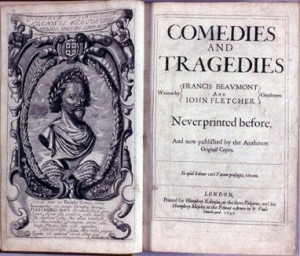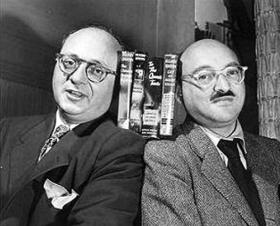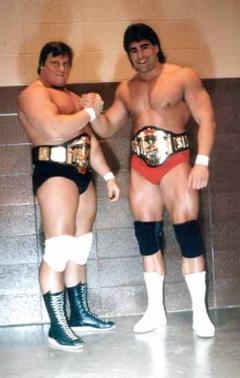Saturday, July 12: Mississippi Mud
TEAMWORK
by John M. Floyd
Much has been said in these columns about having friends who are also writers and readers, folks who share a common interest. I suspect that they’re often some of our closest friends, because they are among the few who understand how we, as writers and readers, think the way we do.
Which brings up another issue.
 1 For several years now, one of my best writing buddies has suggested we collaborate, the two of us, on a screenplay. At first glance that would seem to be a good idea: she and I are both writers, and we both love movies.
1 For several years now, one of my best writing buddies has suggested we collaborate, the two of us, on a screenplay. At first glance that would seem to be a good idea: she and I are both writers, and we both love movies.
The truth is, I don’t think it would be a good idea at all. In fact I’ve been sidestepping the whole deal, and even changing the subject every time it comes up. Why? To me, the answer’s obvious: we’re friends, and I value her friendship. I’d prefer that we remain friends. If we collaborate on a writing project, we might not.
In my opinion, working with another fiction writer on an equal basis would be difficult. How would you go about it? Would one person write a scene and the other edit it, and then switch up for the next scene? Would one write the whole manuscript and the other do nothing but rewrite? Would one handle the dialogue, maybe, and the other the rest of the narrative? How in the hell would all this work?
 2 Okay, I’m not quite as naive as I sound. I know collaboration does work, or at least has worked, for many people: King and Straub, Pronzini and Muller, the Coen brothers, Preston and Child, Glen and Les Charles, the Ellery Queen team, Damon and Affleck, McMurtry and Ossana, and many, many others. But — call me stubborn — I still think it’d be hard to do.
2 Okay, I’m not quite as naive as I sound. I know collaboration does work, or at least has worked, for many people: King and Straub, Pronzini and Muller, the Coen brothers, Preston and Child, Glen and Les Charles, the Ellery Queen team, Damon and Affleck, McMurtry and Ossana, and many, many others. But — call me stubborn — I still think it’d be hard to do.
I actually tried it once. Andrew McAleer, the mystery author and editor of Crimestalker Casebook in Boston, contacted me after he’d published a couple of my stories, and suggested we write a story together and submit it to Alfred Hitchcock’s Mystery Magazine. I agreed. The plan was, he would write the first half of a mystery short story, send it to me, and I’d write the second half. That arrangement suited me fine; I like endings more than beginnings anyhow.
Well, we did it. We wrote the story, Andy sent it to AHMM, we waited a couple months — and it was rejected. (I of course like to think it was rejected before the editor got to my part, and he probably feels the editor was enthralled until she got to the second half, right?) At any rate, it died a swift death. Was the project worthwhile? I think so — I had a great time working on the story, but then I have a great time working on any story. Do I think the story was a good one? I do, actually. I still have a copy someplace. Did we remain friends, Andy and I? Yep. Got an e-mail from him the other day. Do I continue to respect his writing ability? You bet I do. Did I learn anything from the whole process? Sure did. I learned it’s probably easier to write a story by yourself.
This is a complicated thing, fiction writing. Especially the short stuff. We who do it sometimes choose to believe that it’s easy, sometimes tell others it’s easy. But it’s not. It’s fun, but it’s not easy. Putting ordinary people in difficult and even dangerous positions and then making the situation grow steadily worse and then somehow extracting them from their dilemma in a way that is satisfying to the reader, in a space of only several thousand words — well, friends and neighbors, there’s nothing simple about that. The result has to be believable and it has to be entertaining, and if it’s not both it won’t work. And making all the necessary pieces tie together in a seamless way would be, in my opinion, even harder when two people are trying to do it. Writing is a lonely business, sure — but maybe that’s the way it’s supposed to be.
 3 I can of course see how collaboration can have advantages. For one thing, a second person might be able to catch and repair plot holes that the first person didn’t see. Or add to an original idea to come up with something really special and different. Or provide an area of knowledge or writing expertise that the partner hasn’t acquired, or hasn’t perfected. An example: I think I’m pretty good at dialogue, and I don’t think I’m very good at description. I’m also better with action scenes than with characterization. The logical thing for me to do would be to find a writing partner who’s strong in the areas where I’m weak, right? Well, maybe so. Maybe I will, someday. Until then, I’ll just continue to work harder on the things I feel I’m not good at.
3 I can of course see how collaboration can have advantages. For one thing, a second person might be able to catch and repair plot holes that the first person didn’t see. Or add to an original idea to come up with something really special and different. Or provide an area of knowledge or writing expertise that the partner hasn’t acquired, or hasn’t perfected. An example: I think I’m pretty good at dialogue, and I don’t think I’m very good at description. I’m also better with action scenes than with characterization. The logical thing for me to do would be to find a writing partner who’s strong in the areas where I’m weak, right? Well, maybe so. Maybe I will, someday. Until then, I’ll just continue to work harder on the things I feel I’m not good at.
A question for those of you who write: Have you tried collaborating with another writer, on a project? Did it work? Any problems? Would you consider it, or consider it again, in the future? For those of you who are not writers: Do you think collaboration is good or bad? Do you have any favorite writing teams? Do you think two or more heads are truly better than one, in this field of endeavor?
I once read that collaboration is twice the work for half the pay. I like that quote, but I confess I don’t remember who said it.
Maybe it was Andrew McAleer. After having to work with me.
- Frontispiece and title page to the first edition of the collected works of Jacobean playwrights Francis Beaumont and John Fletcher, the most famous collaboration in English literature. –JLW [↩]
- Daniel Nathan and Manford Emmanuel Lepofsky, better known as Frederic Dannay and Manford Bennington Lee, who were even better known as Ellery Queen. –JLW [↩]
- Scott Doring and Tom Zenk, Portland Oregon Wrestling Tag Team Title holders in 1985, from the website of “strongwoman” Julie Havelka. I couldn’t resist including it in an article about partnership, so don’t blame John. Don’t you just love the hair? –JLW [↩]




















Great blog. You raise a lot of interesting questions and perhaps my experience as one-half of Evelyn David will provide some answers.
There are two halves to Evelyn David. We met on an Internet writers forum, each posting our own stories. I live in New York and write nonfiction books for my day job. She lives in Oklahoma and is the coal mine administrator for the state. Until we finished our first mystery, “Murder Off the Books” we had never spoken; we still have never met in person. Now we do speak on the telephone as we plot out our stories, but at the start of the collaboration, we relied on e-mail to outline each scene and exchange chapters.
We each write all characters. After discussing where we are heading, one of us will say, “I’ll start,” and draft a scene or two. The material goes back and forth so many times that I can’t tell you who wrote what.
While I enjoy writing independently, and have 10 nonfiction books to my credit, I enjoy collaborating on fiction because of the opportunity to brainstorm ideas and the camaraderie and support of a co-author. I agree with you that it would be hard to collaborate with a friend. We started out as co-authors and developed a friendship — the professional preceded the personal.
I know the first rule of thumb in collaboration is “don’t do it” for all the reasons you articulated. I think it works for us because (1) neither of us has much of an ego so there are no diva moments; (2) we both have a good sense of humor and as you know, the writing business is tough and if you can’t laugh at the constant rejection and pressure, you should find another line of work; and (3) we have a similar work ethic — each of us is willing to do whatever needs to be done. There’s no standing on ceremony or measuring how much you’ve done in comparison to the other person.
Our first book went into a second printing, and the sequel “Murder Takes the Cake” will be out in late Fall! For more details on Evelyn’s “bio,” please visit our website at http://www.evelyndavid.com.
Thanks for the starting the discussion.
The Northern half of Evelyn David
Marian — Thanks for your insight into what makes your writing team successful. I once met Joyce and Jim Lavene, and it sounds as if their collaboration works for the same reasons that yours does. I do think it’s interesting that, as you said, you two began as co-authors and became friends, rather than the other way around. I wonder if that’s the way this usually happens. (And even more interesting, to me, is that you’ve never met in person!–ain’t e-mail a wonderful thing??)
Hi John,
I’ve never thought about collaboration but I do follow sisters Kris and Kelly (don’t remember their real last names) but they write very successfully as PJParrish. Kris runs a blog under the PJ Parrish name called Cabbages and Kings and she talks all the time about the back and forth of their writing. I remember when their last book revision suggestions came back from the editor Kris pointed out that “as usual” Kelly finished her rewrites first. The blog is splattered with casual info on how the sisters collaborate.
You might want to take a peek. If sisters can collaborate and remain intact, friends should be able to, as well.
Terrie
If Terrie hadn’t mentioned Kristy Montee and Kelly Nichols, a.k.a. P. J. Parrish, I certainly would have … well, gosh durn it, I guess I just did. They are the most successful collaborators on the mystery scene today.
The two sisters are as different as chalk and cheese, which I’m sure contributes to their success, but they are also individually extraordinarily gifted and warm human beings for whom there cannot be enough praise.
And they are fabulous writers.
Mention should also be made of the mother/son duo of Charles and Caroline Todd, writing as Charles Todd, whose Inspector Rutledge series is the best historical mystery fiction currently being written. It would be disingenuous not to mention that Charles is one of my particular buddies, but that fact has no bearing on my opinion of the quality of their work. They do most of their collaboration by Instant Messaging, which I find intriguing.
Very good points, John, however I tend to agree with the others that it can be done, and in some cases, could be the best writing possible for the two authors. I guess you’ll never know if you don’t give it a try. But then again, you seem to know your stuff so what do I know? Just an opinion. Keep up the good work on your column! It’s great!
Thanks to everyone for their comments — maybe I WILL have to give collaborating a try, at some point. But Heaven help the person who has to work with me . . .
Oh, yeah John. There is a John Floyd mentioned in the July issue of Southern Comfort Magazine….
Thanks, Jeff — I’ll check it out. I do know there’s a John A. Floyd who’s the editor of Southern Living magazine, and there are also a couple more John Floyds running around in the writing world as well. What nerve . . .